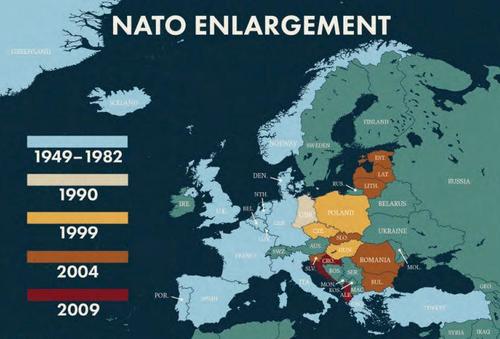'Everyone knows they made promises they wouldn't expand eastwards, but then they [NATO] did the opposite.'
Russian state media sources translated Putin's words to say he's seeking "legal guarantees" from NATO that it will halt its eastward expansion witnessed over the past years and decades since the end of the Cold War. His offer of negotiations comes after Kremlin officials have declared any observed NATO infrastructure or base expansion into Ukraine would be a severe "red line" that would warrant "action".
Putin said that he will "insist on guarantees being set out to exclude the possibility of NATO moving any further to the east, and deploying threatening weapons close to Russian territory."
"I would like to emphasize that we need these to be legal guarantees," he added, "given that our Western colleagues have not fulfilled their respective oral obligations. Everyone knows they made promises they wouldn't expand eastwards, but then they did the opposite. Legitimate Russian security concerns have been ignored and continue to be ignored."
Over
the past days and weeks it's been Ukrainian officials and Kiev's
backers in the West who have charged Russia with a major forces build-up
threatening "invasion" of Ukraine's east. The Kremlin has rejected the claim, saying the accusation is based on regular troop movements and training rotations within its own sovereign borders.
Putin continued in his Wednesday remarks, "the threat at our Western borders is really growing, and we have repeatedly talked about it. It is enough to see how close NATO’s military infrastructure has advanced to the Russian borders. It's more than serious for us."
Meanwhile, NATO leadership has continued warning Moscow not to make any moves toward Ukraine, with Politico detailing Jens Stoltenberg's Tuesday remarks about the "high price" Russia would pay:
Another Russian invasion of Ukraine would carry a "high price," NATO Secretary-General Jens Stoltenberg warned Tuesday, adding that the 30 allies together represent more than 50 percent of the global economy.
"Any future Russian aggression against Ukraine would come at a high price and have serious political and economic consequences for Russia," Stoltenberg said at a news conference following a day of meetings among allied foreign ministers in Riga, Latvia.
This map via Center for Strategic and International Studies shows the steady pace of NATO's eastward expansion...
Russian leadership has since the 1990's protested that Brussels broke prior promises committing to not expand the military bloc right up to Russia's backyard. Western leaders have denied the charge. A study published in the Los Angeles Times years ago agreed: "The West has vigorously protested that no such deal was ever struck. However, hundreds of memos, meeting minutes and transcripts from U.S. archives indicate otherwise."
The report concluded based on the diplomatic archives that "Although what the documents reveal isn’t enough to make Putin a saint, it suggests that the diagnosis of Russian predation isn’t entirely fair. Europe’s stability may depend just as much on the West’s willingness to reassure Russia about NATO’s limits as on deterring Moscow’s adventurism."
The LA Times then described the Bush era of the early and mid-2000s as follows: "Nevertheless, great powers rarely tie their own hands. In internal memorandums and notes, U.S. policymakers soon realized that ruling out NATO’s expansion might not be in the best interests of the United States. By late February, Bush and his advisers had decided to leave the door open." That's the era when several Baltic and East European states formally entered the alliance.


No comments:
Post a Comment